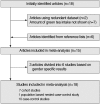Green tea consumption and stomach cancer risk: a meta-analysis
- PMID: 21191454
- PMCID: PMC2984861
- DOI: 10.4178/epih/e2010001
Green tea consumption and stomach cancer risk: a meta-analysis
Abstract
Objectives: Green tea has been suggested to have a chemopreventive effect against various cancers including stomach cancer. The aim of this study is to elucidate the relationship between green tea consumption and stomach cancer risk by meta-analysis.
Methods: Eighteen observational studies were identified using MEDLINE, THE COCHRANE LIBRARY, RISS, and a manual search. Summary relative risks/odds ratios (RR/ORs) for the highest versus non/lowest green tea consumption levels were calculated on the basis of fixed and random effect models. Subgroup analyses were used to examine heterogeneity across the studies.
Results: The combined results indicate a reduced risk of stomach cancer with intake of green tea (RR/OR=0.86, 95% CI=0.74-1.00). Subgroup analysis with six studies that reported differences between the highest and lowest consumption levels equal to or greater than five cups/day revealed a statistically significant protective effect (RR/OR=0.68, 95% CI=0.53-0.87).
Conclusion: Green tea appears to play a protective role against the development of stomach cancer. The results also suggest that a higher level of green tea consumption might be needed for a clear preventive effect to appear. This conclusion, however, should be interpreted with caution because various biases can affect the results of a meta-analysis.
Keywords: Green tea; Meta-analysis; Stomach cancer.
Conflict of interest statement
The authors have no conflict of interest to declare on this study.
Figures



References
-
- Forman D, Burley VJ. Gastric cancer: global pattern of the disease and an overview of environmental risk factors. Best Pract Res Clin Gastroenterol. 2006;20:633–649. - PubMed
-
- Kelley JR, Duggan JM. Gastric cancer epidemiology and risk factors. J Clin Epidemiol. 2003;56:1–9. - PubMed
-
- Kuriyama S, Shimazu T, Ohmori K, Kikuchi N, Nakaya N, Nishino Y, et al. Green tea consumption and mortality due to cardiovascular disease, cancer, and all causes in Japan: the Ohsaki study. JAMA. 2006;296:1255–1265. - PubMed
-
- Jankun J, Selman SH, Swiercz R, Skrzypczak-Jankun E. Why drinking green tea could prevent cancer. Nature. 1997;387:561. - PubMed
LinkOut - more resources
Full Text Sources

